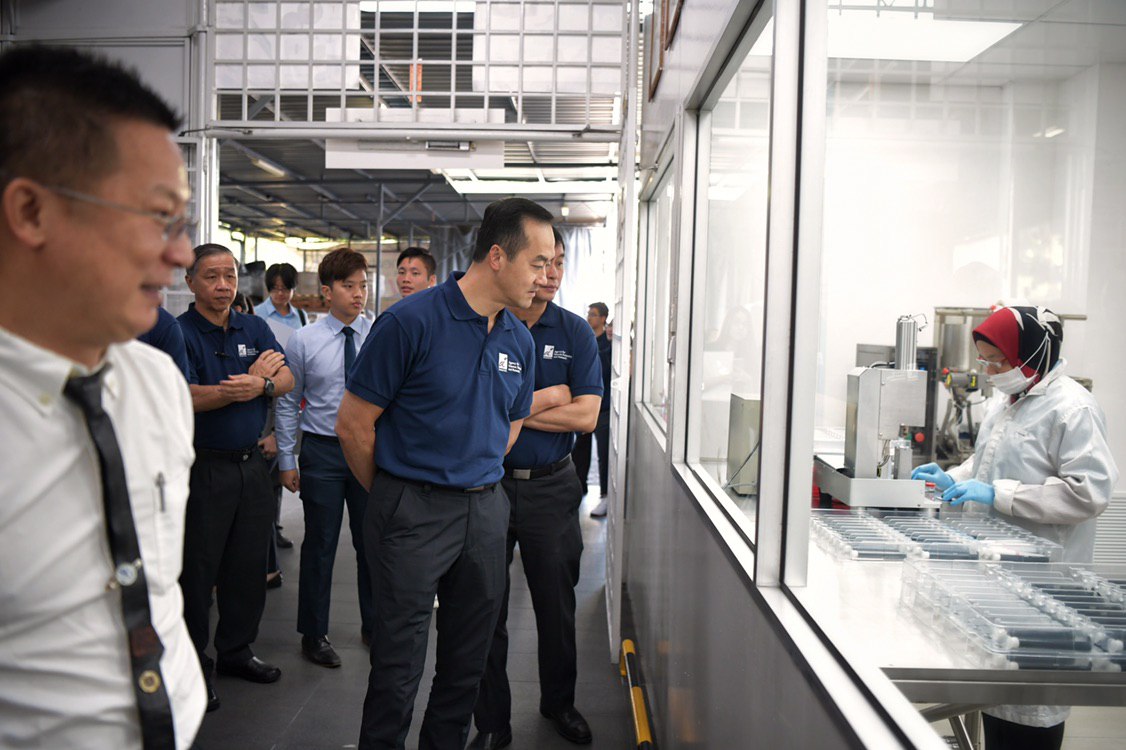More help for SMEs to train workers, tap new technologies in Budget 2019
Sign up now: Get ST's newsletters delivered to your inbox

Senior Minister of State for Trade and Industry Koh Poh Koon touring the facility of medical technology manufacturing firm Racer on Feb 11, 2019.
ST PHOTO: KUA CHEE SIONG
SINGAPORE - More initiatives will be announced in this year's Budget to help small and medium-sized enterprises (SMEs) tap new technologies to enhance the way they operate, but companies are also encouraged to send its employees for upskilling.
Disclosing this, Senior Minister of State for Trade and Industry, Dr Koh Poh Koon said that by adopting new technologies and reskilling its workers, companies can be competitive not just locally but globally as well.
"I encourage SMEs to send staff for upskilling, otherwise you can buy the technology but your workforce may not be able to help you reap the full benefits," said Dr Koh, who made the remarks during a factory visit on Monday (Feb 11) at medical technology (medtech) manufacturing firm Racer.
The firm designs and manufactures high-value medical devices and laboratory equipment.
Details of the new initiatives will be announced in Budget 2019 and the Committee of Supply debates. The budget statement will be delivered on Feb 18.
Dr Koh said the new initiatives will be aimed at helping SMEs digitise and further their Research and Development, as well as train their workforce to make use of these new technologies.
"The existing platforms have more headroom to grow in terms of numbers and I hope SMEs sitting on the fringes will take the proactive step to come forward.
"We will be announcing some other measures that will help to encourage more training and some degree of funding support as well," he added.
Racer is one of many firms to tap the Agency for Science, Technology and Research's (A*Star) Model Factory Initiative.
Among other things, companies across the value chain learn about advanced manufacturing technologies in order to reinvent themselves through technology.
Since 2017, 137 projects have been formed under the initiative and 87 have been completed.
In Racer's case, employees now use an Overall Equipment Effectiveness Monitoring System to get 'live' status updates of the company's machines on a centralised dashboard.
They had to manually track these machines on paper previously.
Another system also helps to reduce production planning time - from 28 hours to under 10 hours a week - by streamlining production operations so the company can track the status of job orders on-the-go.
Racer uses an Inventory Tracking System as well. With a hand-held scanner, employees can track the item's inventory levels, location and the identity of the personnel who handled it.
A cloud-based workflow system also provides progress updates and supervisors can track the work using their mobile phones when they are off-site.
As a result of the initiatives, Racer saw a 70 per cent increase in efficiency and 70 per cent reduction in manufacturing costs.
Dr Koh said: "For SMEs, this makes them more competitive and able to do things in a more precise way. It makes them able to tap into growth opportunities in the medtech sector.
"For SMEs in the manufacturing space to remain competitive not just locally but also globally, digitisation as well as Research and Development and innovation are crucial ingredients for them to continue to succeed."
Technology aside, workers also need to be upskilled to make use of the new tools, Dr Koh added.
Racer has sent workers for Workforce Skills Qualifications (WSQ) courses with 15 employees attending upgrading courses conducted by A*Star to learn to work on a digitised production line.
Over 4,000 professionals from almost 1,500 companies have received WSQ training conducted by A*Star.
"I urge SMEs to tap on the many initiatives we have to bring together a stronger ecosystem and build a more resilient and competitive manufacturing sector," said Dr Koh.


